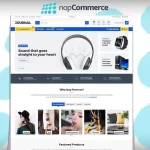Ecommerce marketing is the act of driving top-of-funnel traffic to convert into sales and customers. What’s more, there are many approaches.
From zeroing in on organic traffic and SEO to utilizing Facebook or Google ads to drive targeted traffic, you can blend and coordinate paid strategies with non-paid strategies all with an end goal to sort out which blend converts a great many people.
Yet, no marketing strategy is even static. As marketing tactics and marketplace, calculations develop, so too should your strategy to win the best yield on promotion spend, as well as return on operating expenses related to non-paid development strategies like SEO.
You might have once heard: “On the off chance that you construct it, they will come“.
It’s an incredible statement, from an extraordinary movie.
Sadly, with regards to eCommerce marketing, this notion is totally bogus. At the point when you construct it, they don’t be guaranteed to come.
With US eCommerce revenue scheduled to hit $4.9 trillion by 2023, you don’t have any desire to pass up this great opportunity.
On one hand, essentially fabricating a cutting-edge, feature-rich, and user-friendly website might appear to be a daunting task here’s a clue: it doesn’t need to accompany the right assets).
However, in any event, doing only that, you’re only most of the way there.
To successfully grow an eCommerce business, whether you have a retail presence, you really want a thoroughly examined eCommerce marketing intended to drive brand awareness and increment sales. What’s more, it’s basically impossible to get around it.
Keep in mind, that there’s no “sorcery projectile” with regards to building brand awareness and driving eCommerce sales.
Marketing Channels, Tactics and Tools
New marketing channels are opening consistently.
Immense networks, similar to Google and Facebook, will continue to offer better approaches to arrive at customers and draw in additional advertising dollars.
In view of that, here’s a rundown of the best channels, tactics, and tools to consider while creating your eCommerce marketing plan.
Pay-Per-Click Advertising (PPC)
Pay-per-Click advertising or PPC can be one of the foundational elements in your eCommerce marketing strategy.
In the event you’re new to PPC, your brand would pay a promotion network, similar to Google, each time someone clicks on your advertisement.
Obviously, there are a few sorts of PPC advertisements that I might want to point out paid search, show, and shopping campaigns since they’re generally pertinent to eCommerce marketing achievement.
Furthermore, for the simplicity of understanding, I’ll involve Google as the essential wellspring of all PPC advertisements, since it’s the most famous and least demanding to utilize.
That being said, there are different PPC promotion networks, for example, Bing Ads and Amazon Advertising, that are most certainly worth remembering for your, generally speaking, PPC strategy.
Here is somewhat more information about each:
Paid Search Ads
A Paid Search promotion will show up at the top of your search engine results and exclude any kind of symbolism.
In this manner, it’s an extraordinary strategy, particularly for “in-market” sales leads. Simply consider it… assuming you’re not kidding about “non-iron button-down shirts” you’re in all likelihood in the market to buy that thing.
You’ve distinguished a personal need, and you’re searching for the most ideal option.
Hence, Paid Search advertisements can deliver a high conversion rate and ought to be remembered for your general strategy.
Display Ads
Show advertisements some of the time alluded to as standard ads, should be visible all over well-known websites, apps, and portable games.
Show ads can likewise be served to the user based on the topic of the article or website the user is seeing.
Thus, assuming the user is perusing an article about famous yoga studios in their space, there’s a decent opportunity that a Display promotion for a close-by yoga studio will show up.
Show ads can be perfect for building brand awareness and producing conversions when used to retarget a client, yet by and large, click-through rates will be a lot lower than Search ads.
Also, more significantly, the typical conversion rate across all industries is .77% with Display ads, contrasted with 3.75% for Search ads.
Product Listing Ads (Shopping Campaigns)
With Google Shopping Campaigns and Bing Product Ads, your products can show up straightforwardly inside the search engine results.
In this way, on the off chance that the user is searching for “ladies’ red boots,” they’ll see a lot of pictures of red boots at the top of their search results.
Then, at that point, contingent upon the products that suit their taste, the user will click on the advertisement and be diverted to your online store.
Obviously, in the event that you’re a reseller of different brands, ensure your costs are serious prior to making a plunge.
As you can envision, while surveying similar sets of red boots across various ads, the user will just click on the most minimal publicized cost.
Thus, ensure you’ve done your schoolwork.
Tools to Consider:
- Google Merchant Center: The Google Shopping by Sales and Orders application uses your current product information to consequently create a Product Data Feed in your record.
- Google Ads.
- Amazon Advertising.
- Bing Ads.
Search Engine Optimization (SEO)
Throughout the course of recent years, Search Engine Optimization has developed to improve things.
Before, SEO experts were much the same as fake relief salesman, utilizing dishonest tactics and exploits to support website rankings.
Presently, on the other hand, SEO is more about sticking to available prescribed procedures and procuring your positioning, instead of “working the framework.”
In any case, don’t stress, there are tons of valuable assets to test your site’s SEO wellbeing and track your improvement after some time, like SEMrush and MOZ.
Tools to Consider:
- SEMrush.
- MOZ.
- BigCommerce apps.
Content Marketing
Content marketing is somewhat of a unicorn in the eCommerce space.
Through blog posts, infographics, and recordings, you arrive at additional customers on their own turf: the web.
It’s called inbound marketing, where shoppers come to you and it costs essentially not exactly outbound endeavors, where you go out and track down the shoppers for yourself.
Assuming that your product has an environmental reason, cutting edge innovation, or is downright inventive, consider sending off some composed blog posts framing the points of interest of the products.
Besides being educational for anyone who visits your website, these blog posts will assist you with getting organic traffic from pertinent keywords.
Influencer Marketing
Influencer marketing is basic.
As consumers are presented with an ever-increasing number of advertisements, brands are consolidating various strategies to reach and speak to customers.
Subsequently, a brand will line up with an “influencer” otherwise known as, someone who includes an enormous following and believability inside a specific niche.
Also, since the influencer as of now has the attention and trust of their following, these paid product supports feel less nosy than standard advertisements.
Subsequently, they’re an important device in a marketers toolkit.
Influencer marketing is most commonly seen across social media, YouTube channels, and notable blogs.
Social Media Marketing
Social media is (and will stay) a quickly developing scene of networks and stages that continually have an impact on the manner in which individuals cooperate with brands online.
As marketers, we are tasked with seeing accepted procedures and executing vital campaigns that draw in likely customers, make brand advocates, and in the long run, fuel the reality.
Fortunately, well-known social networks like Facebook, Twitter, and Instagram have been continually carrying out new features and tools to assist brands with really arriving at their target audience.
For instance, with Facebook’s new Dynamic Ads feature, a brand can transfer its whole product inventory to Facebook.
Then, every product will be consequently displayed to intrigued customers with modern evaluation and accessibility, which is an extraordinary device for eCommerce marketers.
This is essential to consider while creating your social media marketing effort:
Social Media Advertising
Each well-known social media network has helpful tools for brands (and marketers) to serve targeted advertisements to expected customers.
A large portion of them operate likewise to Google’s PPC ads; you make an advertisement, set your spending plan, and pay for each click (or various impressions) the promotion gets.
To save you some time, the accompanying social networks have shown to be the most generally embraced and viable for eCommerce marketing:
- Facebook Ads.
- Instagram Ads.
- Twitter Ads.
- Pinterest Ads.
- LinkedIn Ads.
- Snapchat Ads.
Social Commerce
As mentioned, social networks are constantly searching for better approaches to tempt brands, and all the more critically, promoters to their networks.
Thusly, networks like Facebook and Instagram (specifically) have made (genuinely) consistent biological systems that permit customers to find your products, and all the more significantly, buy your products without exploring away from the network.
Organic Social Content
Before social networks were money-production behemoths, they were gatherings to draw in customers and encourage brand support.
Obviously, that hasn’t vanished totally.
In any case, somewhat, brands have been poked towards the paid advertising course to deliver the best results.
That being said, don’t disregard organic social content.
It assumes a significant part while building brand awareness, and at least, is fundamental to keeping up with strong SEO.
This improves the way to buy, and accordingly, increments conversion rates.
Email Marketing
While making a far-reaching eCommerce marketing plan, email can assume a vital part.
On one hand, it may not get the attention of more current, trendier roads for marketing your eCommerce business, however, when done right, email can create a consistently exceptional yield on investment.
That being said, don’t hope to “cluster and impact” your direction to high conversion rates and expanded request values.
Taking a more key, smart way to deal with email will ultimately yield exceptionally certain results.
By the day’s end, customers will peruse messages that arouse their personal interests.
In this way, ensure your messages are contextual and locked in. Don’t send a concert ticket promotion for a show in Los Angeles to your whole email list.
That would be irritating for everyone beyond Southern California.
Besides newsletter campaigns, at an absolute minimum you ought to integrate the accompanying strategies:
- Abandoned Carts.
- Up-Sells and Cross-Sells.
- Promotional Offers.
- Client Loyalty and Re-Engagement.
Affiliate Marketing.
Affiliate marketing is the course of an eCommerce merchant paying a commission to an outer website for any sales produced from their reference traffic.
The sales are followed by means of affiliate joins, which can be carried out by utilizing different affiliate programs.
Merchants likewise get to pick their own commission rates, with a percentage of the deal cost generally going from 5 to 30%. It’s likewise very ROI positive.
Local Marketing
Local marketing – otherwise called “location-based marketing” and “neighborhood marketing” – is the most common way of advancing your website and online advertising to assist with driving people walking through and awareness in local regions.
In addition, assuming you have a storefront or local presence, there are various strategies you can use to continue developing that impression.
Enhance your site with local keywords
Ensure you put important keywords about the town you’re in, as well as any lining towns or regions.
Foster specific greeting pages about your town, make product collections that champion local businesses or patterns, or even make local occasion campaigns with adjoining businesses.



